In this ultimate guide on How to Clean a Gas Grill, we’ll walk you through why keeping your grill clean should be a priority, the benefits it brings, and how a well-maintained grill can transform your outdoor cooking experience. Whether you’re a seasoned grill master or new to the art of grilling, understanding the ins and outs of cleaning your gas grill is crucial. So, let’s dive into the world of grill maintenance, where a little effort goes a long way in elevating your grilling game.
There’s nothing quite like the aroma of food sizzling on a gas grill, the centerpiece of many backyard barbecues and family gatherings. Yet, the key to ensuring that your grill continues to provide those delightful culinary experiences lies in regular maintenance, particularly in cleaning. Cleaning your gas grill is not just a chore; it’s an essential part of grill ownership that impacts everything from the taste of your food to your safety and the longevity of your grill.
Why Cleaning Your Gas Grill Matters
Enhances Flavor: One of the most immediate benefits of regularly cleaning your gas grill is the noticeable improvement in the flavor of your grilled foods. Over time, old grease, food particles, and other residues build up on grill grates and interiors. This accumulation not only affects the taste of your food, making it less appealing and potentially hazardous to your health, but it also interferes with the even distribution of heat. By thoroughly cleaning your gas grill, you ensure that each meal is as delicious and savory as intended, free from the unwanted flavors of yesterday’s barbecues.
Prevents Dangerous Flare-Ups and Potential Fires: Beyond taste, safety is a paramount reason for keeping your grill clean. Accumulated grease and fat are prime culprits for dangerous flare-ups, which can quickly escalate into uncontrollable fires if not properly managed. Regular cleaning significantly reduces the risk of these fiery hazards, ensuring a safe environment for you and your loved ones to enjoy the grilling experience.
Extends the Life of Your Grill: Investing in a gas grill is no small expenditure, and like any investment, you want it to last. Rust and decay are the natural enemies of your grill’s longevity, often hastened by neglect and poor maintenance. Moisture trapped by grease and debris accelerates corrosion, compromising the structural integrity of your grill. Regular cleaning and maintenance routines combat these elements, preserving your grill’s condition and extending its usable life span. A clean grill not only operates more efficiently but also stands the test of time, saving you money and the hassle of premature replacements.
By understanding the critical importance of how to clean a gas grill you not only enhance your grilling experience but also ensure the safety and longevity of your grill. It’s a simple practice that yields significant benefits for every grill enthusiast.
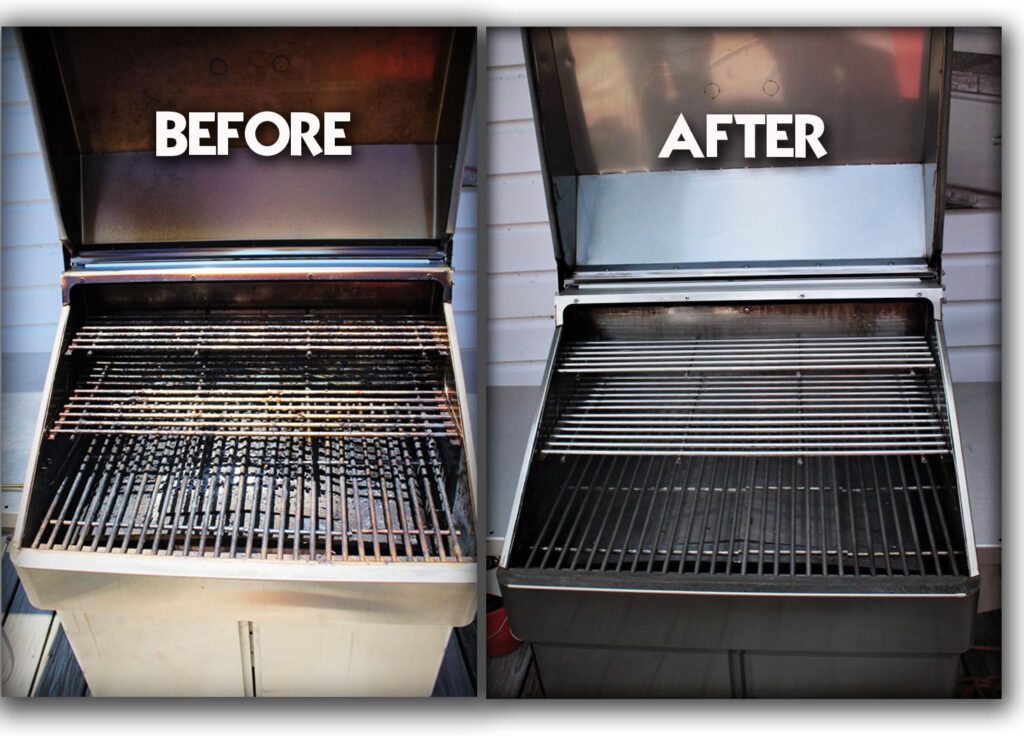
What You’ll Need: Essential Tools for Cleaning Your Gas Grill
Before diving into the nitty-gritty of cleaning your gas grill, it’s important to gather all the necessary tools and cleaning materials to ensure a smooth and effective cleaning process. Here’s a comprehensive list of what you’ll need to get your grill looking and performing its best:
- Grill Brush: A sturdy grill brush is indispensable for scrubbing away burnt-on food particles and grease. Look for one with a long handle to keep your hands away from the heat and bristles that won’t easily fall out and stick to the grates.
- Cleaning Solution: There are many commercial grill cleaners available, but you can also make an effective homemade solution with items you likely already have. A mixture of vinegar and water, or baking soda and water, can work wonders for cutting through grease.
- Protective Gloves: Cleaning a grill can be a messy job, and some cleaning solutions can be harsh on your skin. A pair of durable gloves will protect your hands from grease, grime, and any chemicals you might use.
- Sponge or Scouring Pad: For areas that need a gentler touch or for wiping down surfaces after scrubbing, a sponge or non-metallic scouring pad is useful. Avoid using metallic pads on stainless steel surfaces to prevent scratches.
- Bucket of Warm Water: Warm water will be needed to rinse your sponge or pad during the cleaning process and to mix with your chosen cleaning solution.
- Paper Towels or Clean Cloths: Have plenty of paper towels or clean cloths on hand for wiping down surfaces, drying the grill after cleaning, and applying and buffing any stainless steel polish if applicable.
- Plastic Scraper: A plastic scraper can be handy for gently removing hardened grease and food residues without damaging the surfaces of your grill.
- Stainless Steel Cleaner (Optional): If your grill is stainless steel and you want to restore its shine, a stainless steel cleaner can be used after the grill is clean and dry.
Gathering these tools and materials before you start will make the cleaning process more efficient and less of a chore. With everything at hand, you’re ready to tackle the task of cleaning your gas grill and ensuring it’s in top condition for your next barbecue session.
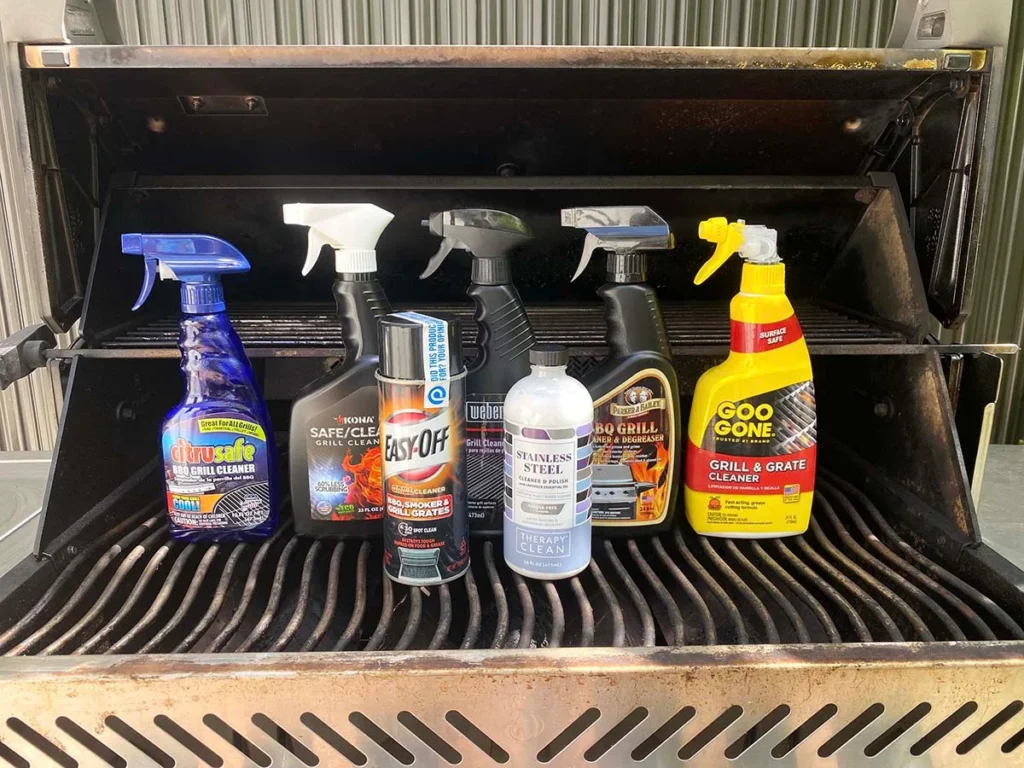
Safety First: Preparing to Clean Your Gas Grill Safely
Before embarking on the task of cleaning your gas grill, it’s crucial to prioritize safety to prevent accidents and injuries. Here are some essential safety precautions to keep in mind:
- Ensure the Grill is Off and Cooled Down: Before you start cleaning, make sure your grill is completely turned off. If you’ve used the grill recently, allow it sufficient time to cool down completely. Attempting to clean a hot grill can lead to burns and other injuries.
- Disconnect the Propane Tank: For gas grills, disconnecting the propane tank is a vital safety step. This eliminates the risk of gas leaks or accidental ignition while cleaning. Make sure the tank is turned off before disconnecting it, and store it in a safe, well-ventilated area away from any potential sources of ignition.
- Wear Protective Gloves: Cleaning a grill often involves dealing with grease, grime, and potentially harsh cleaning agents. Wearing a sturdy pair of gloves will protect your hands from irritants and keep them clean as you work.
- Ventilation: If you’re using commercial cleaners or degreasers, ensure you’re working in a well-ventilated area to avoid inhaling fumes. Outdoor cleaning is ideal, but if you’re in a semi-enclosed space, make sure it’s well-ventilated.
- Read Product Instructions: If you’re using commercial cleaning products, read and follow the manufacturer’s instructions and safety warnings. Some cleaners may require special handling or safety equipment like goggles or masks.
By adhering to these safety precautions, you can ensure that your grill cleaning process is not only effective but also safe. Taking these steps helps prevent accidents and allows you to focus on the task at hand, ensuring your gas grill is cleaned thoroughly and ready for your next grilling adventure.
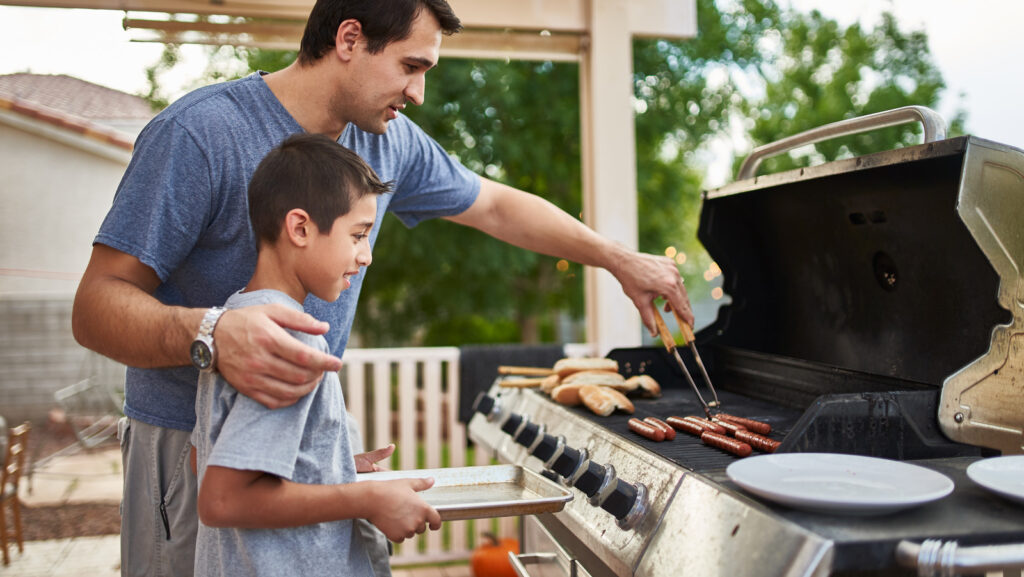
Step-by-Step Process for How to Clean a Gas Grill
Cleaning your gas grill thoroughly not only enhances its performance but also extends its lifespan. Follow this detailed guide to tackle each component effectively.
Exterior Cleaning:
- Stainless Steel Surfaces: Use a dedicated stainless steel cleaner and a soft cloth to wipe down the exterior. Always rub in the direction of the grain to avoid scratches. For everyday cleaning, warm soapy water and a soft sponge work well.
- Painted Surfaces: Mild soap and warm water are best for painted exteriors. Use a soft sponge to avoid chipping the paint. Rinse thoroughly and dry with a soft cloth to prevent water spots.
- Enamel Coatings: For grills with enamel finishes, use a gentle cleaner and avoid abrasive tools that can damage the surface. Wipe with a microfiber cloth for a streak-free finish.
Grill Grates:
- Remove the grates and pre-soak them in a mixture of warm water and dish soap to loosen burnt-on food and grease.
- Use a grill brush or a ball of aluminum foil held with tongs to scrub the grates clean. For porcelain-coated grates, use a nylon brush to avoid scratching the surface.
- Rinse thoroughly and dry before placing them back in the grill.
Burners and Flame Tamers:
- Carefully remove the burners and flame tamers, inspecting them for any blockages. Use a grill brush or a pipe cleaner to clear out any obstructions in the burner ports.
- Wipe down the burners and flame tamers with a damp cloth to remove any residue. Ensure they are completely dry before reinstallation.
- Check for signs of wear or damage, replacing any defective parts to ensure proper grill function.
Cooking Box and Grease Management System:
- With the grates, burners, and flame tamers removed, use a grill brush and soapy water to scrub the inside walls of the cooking box. Avoid using water on the gas valves.
- Remove any debris and grease from the bottom of the grill. Clean out the grease management system, whether it’s a tray or a cup, disposing of the grease properly.
- Wipe everything down with a damp cloth and ensure it’s dry before reassembling the grill.
Reassembly and Post-Cleaning Checks:
- Carefully reassemble your grill, ensuring all components are securely in place.
- Reconnect the propane tank (for gas grills), open the gas supply, and perform a leak check using soapy water around the connection points. Look for bubbles that indicate a gas leak and address any issues before lighting the grill.
- Light the grill and let it run for a few minutes to ensure everything is working correctly and to burn off any residual cleaning agents.
By following these step-by-step instructions, you’ll ensure your gas grill is clean, safe, and ready for your next grilling session. Regular maintenance not only contributes to the longevity of your grill but also to the safety and quality of your outdoor cooking experiences.

Troubleshooting Common Cleaning Challenges
Even with regular maintenance, you might encounter a few hiccups along the way. Here are solutions to some common cleaning challenges that can help keep your gas grill in top condition.
Rust Formation
- Prevention: Regularly oiling your grill grates and protecting your grill with a cover when not in use can help prevent rust.
- Treatment: For minor rust, use a grill brush or medium-grit sandpaper to gently scrub the affected area. After removing the rust, apply a thin layer of cooking oil to protect the surface. For severe rust that compromises the integrity of the grill, consider replacing the affected parts.
Stubborn Residue
- Soaking: For grates and parts with stubborn, burnt-on residue, soaking in a solution of warm water and dish soap or vinegar for several hours or overnight can help loosen the grime.
- Scrubbing: Use a grill stone, scraper, or steel wool for tough spots. Be cautious with porcelain-coated grates to avoid scratching; a nylon brush is more suitable.
Malfunctioning Burners After Cleaning
- Blockages: Ensure there’s no debris or cleaning residue blocking the burner ports. Use a thin wire or needle to clear any obstructions.
- Alignment: Check if the burners are properly aligned with the gas ports. Misalignment can lead to uneven flames or difficulty lighting.
- Replacement: If a burner is damaged or excessively corroded, it may need to be replaced to ensure safe and efficient grilling.
Flame Tamers and Heat Distribution Issues
- Cleaning: Flame tamers can accumulate grease and debris, affecting heat distribution. Ensure they are thoroughly cleaned and free of obstructions.
- Positioning: Incorrectly positioned flame tamers can lead to hot spots and uneven cooking. Refer to your grill’s manual to ensure they are correctly placed.
By addressing these common challenges with proper care and maintenance, you can prolong the life of your gas grill and enjoy many seasons of successful grilling. Remember, regular checks and cleaning can prevent many of these issues from becoming problematic, ensuring your grill remains a reliable centerpiece for your outdoor cooking adventures.

Conclusion: The Lasting Benefits of Regular Grill Maintenance
As we wrap up this ultimate guide for How to Clean a Gas Grill, it’s important to remember that a clean grill is the cornerstone of exceptional outdoor cooking. Not only does it ensure the safety and longevity of your grill, but it also enhances the flavor of your food, making each meal a memorable experience. Regular maintenance goes beyond mere cleanliness; it’s an investment in the quality of your grilling and the longevity of your grill.
Keeping your grill clean and well-maintained might seem like a daunting task at first, but with the right tools and techniques, it can easily become a rewarding part of your grilling routine. The effort you put into cleaning and caring for your grill pays dividends in delicious meals, safe gatherings, and the avoidance of costly repairs or replacements down the line.
We encourage you to make grill maintenance a regular habit, integrating it into your grilling rituals. By doing so, you’re not just taking care of a piece of cooking equipment; you’re ensuring that every barbecue is as thrilling, flavorful, and safe as possible. Remember, a well-maintained grill is the heart of the backyard—a place where food, fun, and memories come together under the open sky.
Thank you for joining us on this journey through the ins and outs of keeping your gas grill in pristine condition. Here’s to many happy, delicious, and safe grilling seasons ahead with your impeccably maintained grill at the center of it all. Happy grilling!

FAQs: Your Grill Cleaning Questions Answered
How often should I clean my gas grill?
- For optimal performance and safety, it’s recommended to do a light cleaning after each use, which involves brushing the grates and wiping down exterior surfaces. A deeper clean, which includes checking burners and cleaning the interior, should be done at least 2-3 times per year, depending on how frequently you grill.
What’s the best time of year for a deep clean of my grill?
- Early spring is an ideal time for a thorough cleaning to prepare for the grilling season. Additionally, a deep clean in late fall can help protect your grill during the winter months, especially if you plan to store it.
Are specific cleaning products necessary for my gas grill?
- While there are many commercial grill cleaning products available that do a great job, you can also use simple household items like vinegar, baking soda, and dish soap for effective cleaning. If you have a stainless steel grill, using a cleaner specifically designed for stainless steel can help maintain its shine without damaging the surface.Master ‘How to Clean a Gas Grill’ with our comprehensive guide. Discover essential tips and techniques for spotless grilling and optimal performance.
Call to Action: Join the Conversation
We hope this guide has armed you with the knowledge and motivation to keep your gas grill in top-notch condition. But we know the conversation doesn’t end here. You, our readers, are a vast resource of tips, tricks, and tales from your own grilling experiences.
- Got a grill cleaning hack that works wonders? Share it in the comments below!
- Questions about maintaining your specific type of grill? We’re all ears—ask away, and let’s help each other out.
- Looking for advice on a grilling topic we haven’t covered yet? Tell us what you want to read about in future blog posts.
Your insights, inquiries, and suggestions enrich our community and help make Next Level Backyard a vibrant hub for all things grilling. Let’s keep the flames of conversation burning as brightly as our grills. Happy grilling, and remember—clean grills make for better meals and even better memories!
Thank you for reading How to Clean a Gas Grill
Do you have a model below? Checkout how to clear their specific models!
Cleaning your American Made Grill
Do you have a griddle? Check out Cleaning Your Blackstone Griddle

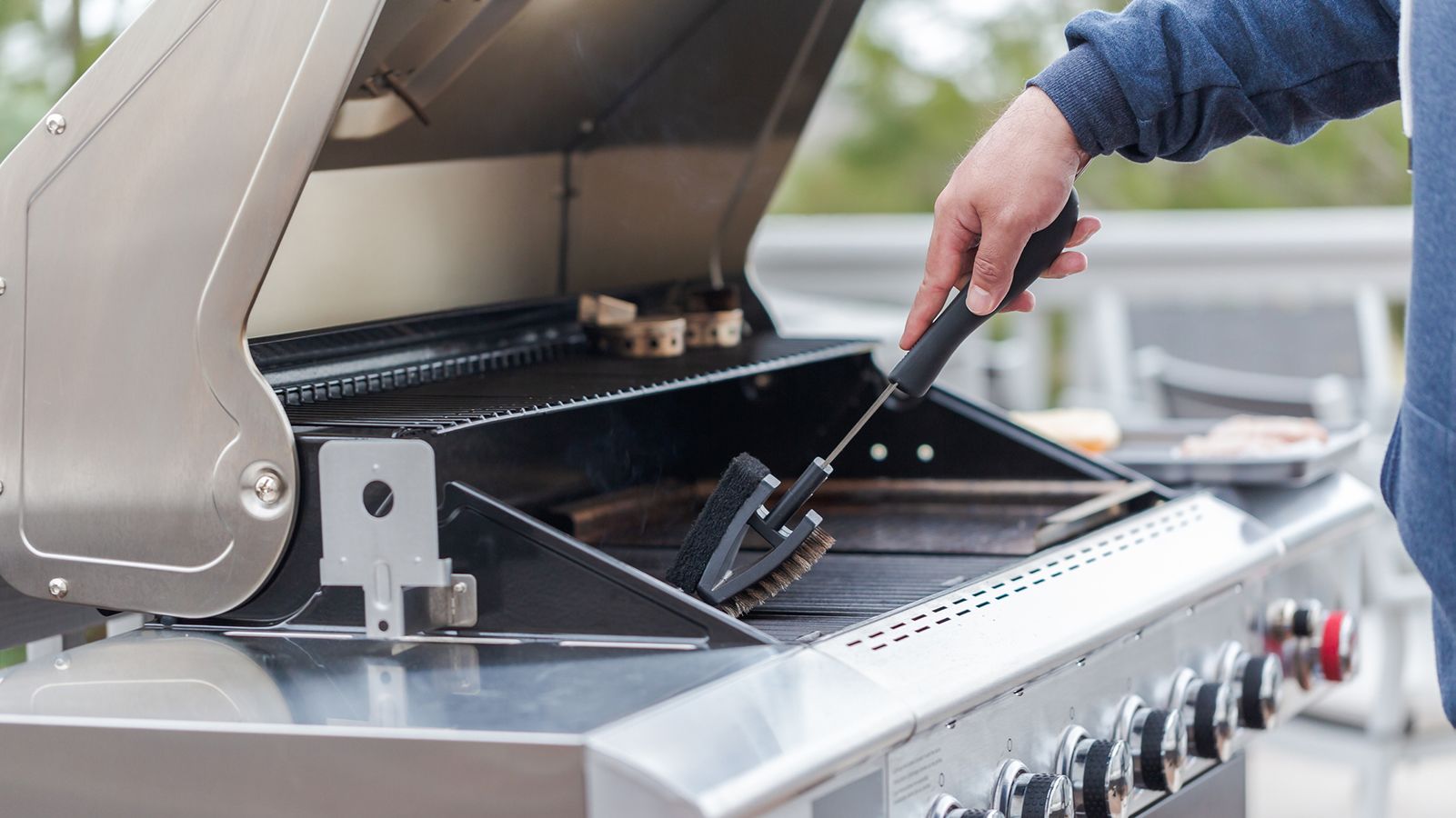

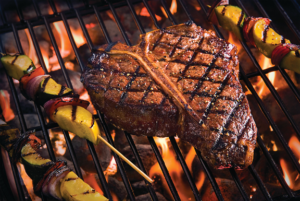


Pingback: How to Create Perfect Grill Marks Every Time - Next Level Backyard